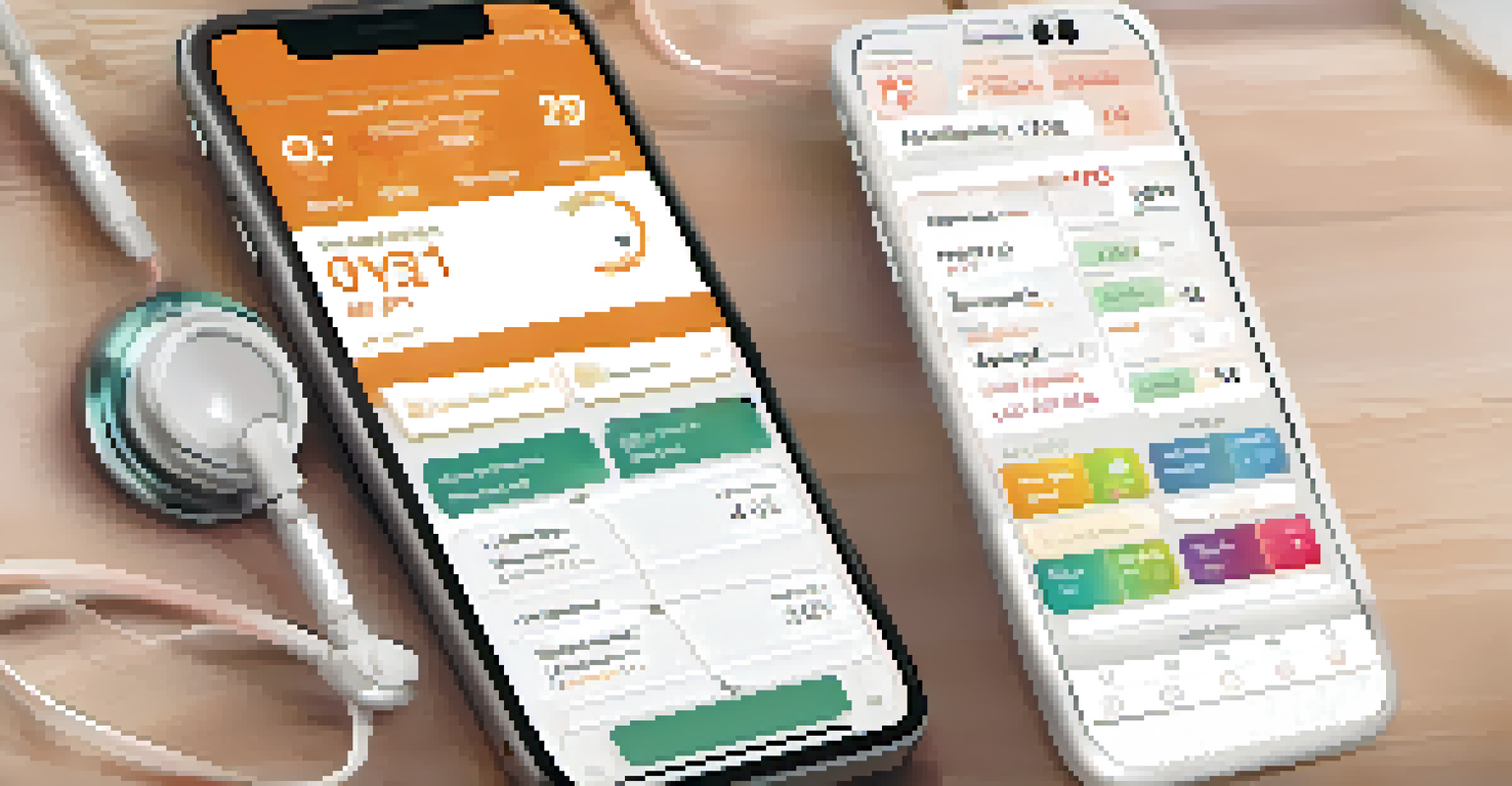The Role of Mobile Health Apps in EHR Integration

Understanding Mobile Health Apps in Healthcare
Mobile health apps, often referred to as mHealth apps, are software applications designed to support health management via smartphones and tablets. These apps provide users with a range of functionalities, from medication reminders to telehealth services, making healthcare more accessible than ever. By leveraging technology, mHealth apps empower patients to take charge of their health, improving overall engagement in their care.
Mobile health applications have the potential to transform healthcare delivery by empowering patients to manage their own health.
As the demand for digital health solutions grows, so does the need for seamless integration with electronic health records (EHR). This integration is crucial because it enables healthcare providers to access and update patient information in real-time, ensuring that care decisions are based on the most current data. This not only enhances the quality of care but also reduces the risk of errors that can occur when information is siloed.
The synergy between mobile health apps and EHR systems creates a comprehensive view of patient health, facilitating better communication between patients and providers. As we delve deeper into this topic, we will explore various aspects of how these apps play a pivotal role in EHR integration.
Benefits of EHR Integration with Mobile Health Apps
One of the primary benefits of integrating mobile health apps with EHR systems is the enhancement of patient engagement. With easy access to their health information, patients can actively participate in their care, leading to better adherence to treatment plans. For instance, patients can track their symptoms, medication schedules, and appointments, all of which can be synced with their EHR for a comprehensive health overview.

Moreover, this integration helps healthcare providers make informed decisions quickly. When doctors can view real-time data from mobile health apps alongside EHR data, they can tailor their treatment plans more effectively. This leads to improved patient outcomes, as providers have a complete picture of a patient’s health at their fingertips.
Mobile Health Apps Enhance Care
Mobile health apps empower patients by providing easy access to health information, fostering engagement and adherence to treatment plans.
Additionally, the integration reduces administrative burdens on healthcare staff. By automating data entry and ensuring that information is updated consistently across platforms, healthcare providers can spend more time focusing on patient care rather than paperwork.
Enhancing Patient-Provider Communication
Mobile health apps serve as a bridge for communication between patients and healthcare providers. Through features like secure messaging and appointment scheduling, patients can reach out to their providers without the hassle of phone calls or waiting for office hours. This immediate access fosters a sense of trust and transparency in the patient-provider relationship.
The integration of mobile health apps with EHRs is crucial in ensuring that healthcare is not just reactive, but proactive.
Furthermore, when patients can share real-time health data through these apps, providers can respond promptly to any concerns or changes in condition. For example, if a patient reports elevated blood pressure through an app, a provider can quickly review the data in the EHR and provide timely advice or intervention. This proactive approach can significantly impact patient health outcomes.
Overall, the integration of mobile health apps into EHR systems enhances the flow of communication, promoting a collaborative environment where patients feel heard and supported in their health journeys.
Challenges in EHR Integration with Mobile Apps
Despite the numerous advantages, integrating mobile health apps with EHR systems is not without its challenges. One major hurdle is ensuring interoperability between different systems. Not all EHRs are designed to communicate seamlessly with various mobile applications, which can create gaps in data sharing and limit the effectiveness of integration.
Privacy and security concerns also play a significant role in the hesitance to adopt mobile health apps. With sensitive patient information being transmitted and stored, healthcare providers must ensure that robust security measures are in place to protect against data breaches. Patients need to feel confident that their health information is secure, which is paramount for successful integration.
EHR Integration Improves Outcomes
Integrating mobile health apps with electronic health records allows healthcare providers to make informed decisions quickly, leading to better patient outcomes.
Additionally, there is the issue of user adoption. While many patients are eager to use mobile health apps, not everyone is tech-savvy. Ensuring that all patients, regardless of their technological proficiency, can effectively use these apps is essential for maximizing their potential benefits.
The Role of Data Analytics in Integration
Data analytics plays a crucial role in enhancing the integration of mobile health apps with EHR systems. By analyzing the data collected from these apps, healthcare providers can identify trends and patterns that inform treatment decisions. For example, if analytics reveal a spike in reported symptoms among a specific demographic, providers can adjust their care strategies accordingly.
Moreover, incorporating predictive analytics can help in anticipating patient needs and potential health crises. By analyzing historical data from both EHRs and mobile health apps, providers can proactively address health issues before they escalate. This data-driven approach not only improves patient outcomes but also optimizes resource allocation within healthcare facilities.
As we continue to advance technologically, the importance of data analytics in integrating mobile health and EHR systems will only grow, paving the way for more personalized and effective patient care.
Future Trends in Mobile Health and EHR Integration
Looking ahead, the future of mobile health apps and EHR integration is promising. As technology evolves, we can expect increased functionality and improved user interfaces that make these apps even more intuitive. Features like artificial intelligence and machine learning will likely enhance personalization, tailoring health recommendations to individual patient needs.
Another trend to watch is the rise of wearable technology, which can seamlessly feed data into mobile health apps and EHR systems. For instance, devices that monitor heart rates or glucose levels can provide real-time data that informs clinical decisions. This level of integration will create a more holistic view of a patient’s health, allowing for proactive care.
Data Analytics Drives Better Care
Data analytics enhances the integration of mobile health apps with EHR systems, enabling healthcare providers to identify trends and proactively address patient needs.
Ultimately, as mobile health apps continue to mature and integrate with EHR systems, we can anticipate a healthcare landscape that is more connected, efficient, and centered around patient needs.
Regulatory Considerations for Integration
When discussing the integration of mobile health apps and EHRs, it's essential to consider the regulatory landscape. Various laws and regulations govern how patient data can be handled, including the Health Insurance Portability and Accountability Act (HIPAA) in the United States. Compliance with these regulations is crucial to protect patient privacy and ensure that data is used responsibly.
Healthcare providers must also stay updated on any changes in regulations that could impact how mobile health apps are developed and integrated with EHR systems. This includes understanding what data can be shared and how it should be secured. Failure to comply can result in significant penalties and damage to a provider's reputation.

As mobile health technology evolves, so too will the regulations surrounding it. Staying informed and adaptable will be key for healthcare providers looking to harness the benefits of integration while remaining compliant.